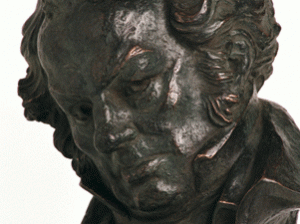Sunday Bloody Sunday, Star Wars, and perhaps Gunfight at the O.K. Corral: this year’s Goya cinema awards ceremony on February 13 looks like producing more off-stage drama than the content of all those movies put together.

Topping the bill in this very public spat is Ángeles González-Sinde, a scriptwriter and director herself and former president of the Spanish Cinema Academy, who in her current role as culture minister is trying to push through legislation against P2P downloading sites along the lines of that in place in France, the UK, and the United States. The new legislation has been dubbed the “Sinde Law” in her honour.
In her quest to protect what she calls “Spain’s creators”, González-Sinde mistakenly believed her leading man was going to be the Cinema Academy’s current president, filmmaker Alex de la Iglesia. De la Iglesia is in the running for a host of Goya gongs for his Spanish Civil War yarn Balada triste de trompeta.
De la Iglesia initially seemed to be reading from the same script as González-Sinde on the downloading issue, but soon got ideas of his own. After Twittering to all and sundry that he had illegally downloaded more than his fair share of movies over the years, among them plenty of porn, he then decided that González-Sinde’s highly unpopular proposals —which by now had been watered down after the opposition Popular Party saw which way the wind was blowing and weighed in with several amendments— were going to “pit internet users against the creative community.”
De la Iglesia said he was unhappy with the Sinde Law, and would be stepping down as president of the Cinema Academy in protest. But not until after the Goya gala on February 13, which he, as the president, gets to present.
He duly penned an article in El País newspaper supposedly explaining his decision, but which this writer, after several readings, failed to glean much from.
Lurking in the background, and, it would seem, unhappy in her supporting role as the Cinema Academy’s deputy president, is Iciar Bollaín, whose La lluvia también is also a contender to sweep the board on February 13.
Following De la Iglesia’s announcement that he was stepping down in protest at the anti-downloading law, the culture minister let it be known that she wouldn’t feel comfortable attending the Goya gala if he was presiding. González-Sinde suggested that Bollaín, as the Academy’s number two, would be the ideal choice to oversee the ceremony until a new president could be elected. Bollaín, meanwhile, had issued a press statement saying that it was such a shame that De la Iglesia had spoiled everybody’s evening with his resignation, but that she respected him and despite disagreeing with his position over the Sinde Law, the pair were great friends. The media have had a field day digging up recent photos of events attended by the two, in which Bollaín is literally looking askance at De la Iglesia.
This isn’t the first time that fierce spats have been revealed within the Spanish Cinema Academy. Oscar-winning director Pedro Almodóvar resigned as president a few years ago in protest at the voting system for category awards.
These tensions seem to be at least partly due to the fact that when the Academy was set up in 1985, its founders decided to follow the French model, which is run by working directors and actors (in the US and British industries, the top jobs are all filled by veterans of the industry, either retired, but who have generally occupied behind-the-scenes roles and have no axe to grind).
Aside from the constant clashes of egos that the Spanish Cinema Academy is subject to as a result of so many actors and directors running the show, this policy exposes it to suspicions that those in the top posts are merely using it to further their own careers. This year’s Goya ceremony is the most eagerly awaited for years – but not because of the movies or the prizes. Let’s face it, everyone loves a good fight.
Leave a Reply
You must be logged in to post a comment.